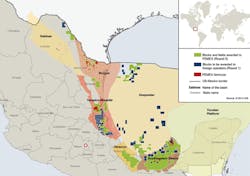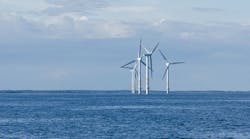Mexico revises rules for second phase of Round One auction
Mexico's oil regulator has unveiled more attractive rules for the second phase of the country's Round One oil auction, according to a report in the Latin American Herald Tribune. The changes include lowering corporate guarantees and making other changes after a disappointing first phase.
In late July, Mexican government officials indicated that they would postpone auctions for deepwater oil exploration and production contracts, and adjust the terms of upcoming tenders.
In the second phase, scheduled for Sept. 30, bidders will be competing for five shallow-water areas off the coasts of the Gulf coast states of Tabasco and Campeche with reserves estimated at 671 MMboe.
Under the new rules, a company that is the operator of a consortium bidding for one production-sharing contract may now also bid individually for a separate contract.
In another change, the commission also said a $2.5-million bid security guarantee will cover all contracts a bidder is awarded and will not need to be provided for each separate block.
That guarantee, as well as a performance guarantee that has been set at 50% of the minimum work program, may be reduced annually in proportion to the winning bidder's progress in fulfilling its contractual obligations, said Martin Alvarez, the CNH's bids coordinator.
In another change, the CNH added a required insurance policy to each contract to cover up to $1 billion in damage from spills or accidents.
For each block, winning bidders also must hire a service provider that specializes in well control.
The changes come after phase one of the Round One oil auction, the first held since Mexico opened its oil industry to private and foreign investment, ended in disappointment.
The government had expected that between 30-40% of the 14 shallow-water exploration blocks on offer in that July auction would be awarded, but only two were acquired, both by a consortium made up of Mexico's Sierra Oil & Gas, Houston-based Talos Energy, and Britain's Premier Oil.
Mexican state-owned oil company PEMEX, which obtained 83% of the country's proven and probable reserves and 21% of its potential resources in a so-called "Zero Round" of non-competitive bidding last year, did not participate in the initial phase of Round One.
Mexico's government is looking to the energy overhaul to attract tens of billions of dollars in investment and reverse a roughly 30% decline in Mexico's oil output, which peaked at 3.38 MMb/d in 2004 and currently stands at roughly 2.3 MMb/d.
Mexico is starting small with its offer of shallow-water fields and onshore blocks this year and saving the potentially bigger deepwater fields in the Gulf of Mexico for later tenders.
US GoM Lease Sale 246 yields $22.7 million in high bids
In mid-August, the US Department of the Interior's Bureau of Ocean Energy Management (BOEM) held an oil and gas lease sale for the Western GoM that drew $22,675,212 in high bids for tracts on the US outer continental shelf offshore Texas.
A total of 5 offshore energy companies submitted 33 bids on 33 tracts, covering about 190,080 acres.
"The Gulf remains a critical component of our nation's energy portfolio and holds important energy resources that spur economic opportunities for Gulf producing states, creating jobs and home-grown energy and reducing our dependence on foreign oil," said BOEM Director Abigail Ross Hopper. "While this sale reflects today's market conditions and industry's current development strategy, it underscores a steady, continued interest in developing deepwater federal offshore oil and gas resources."
Lease Sale 246 builds on the first seven sales held under the Obama Administration's Outer Continental Shelf Oil and Gas Leasing Program for 2012-2017 (Five-Year Program) that offered more than 60 million acres for development, garnered $2.9 billion in bid revenues, and awarded 1,038 leases. The Five-Year Program makes available all offshore areas with the highest resource potential and includes 75% of the nation's undiscovered, technically recoverable offshore oil and gas resources.
"As one of the most productive basins in the world, the Gulf of Mexico continues to be the keystone of the nation's offshore oil and gas resources," Hopper said.
"The continuing drop in oil prices and low natural gas prices obviously affect industry's short-term investment decisions, but the Gulf's long-term value to the nation remains high and the president's energy strategy continues to offer millions of offshore acres for development while protecting the human, marine and coastal environments, and ensuring a fair return to the American people."
Lease Sale 246 offered 4,083 unleased blocks, covering about 21.9 million acres, located from nine to 250 nautical miles offshore in water depths ranging from 16 to more than 10,975 ft (5 to 3,340 m).
The lease terms include a range of incentives to encourage diligent development and ensure a fair return to taxpayers. The leases would also allow a lessee to earn a longer lease term for spudding a well in deeper water or by drilling to a minimum target depth.
Each bid will go through a strict evaluation process within BOEM to ensure the public receives fair market value before a lease is awarded.
The top bids in the lease sale included those from Ecopetrol America Inc., BP Exploration & Production Inc., Anadarko US Offshore Corp., BHP Billiton Petroleum (Deepwater) Inc., and Peregrine Oil & Gas II, LLC.







